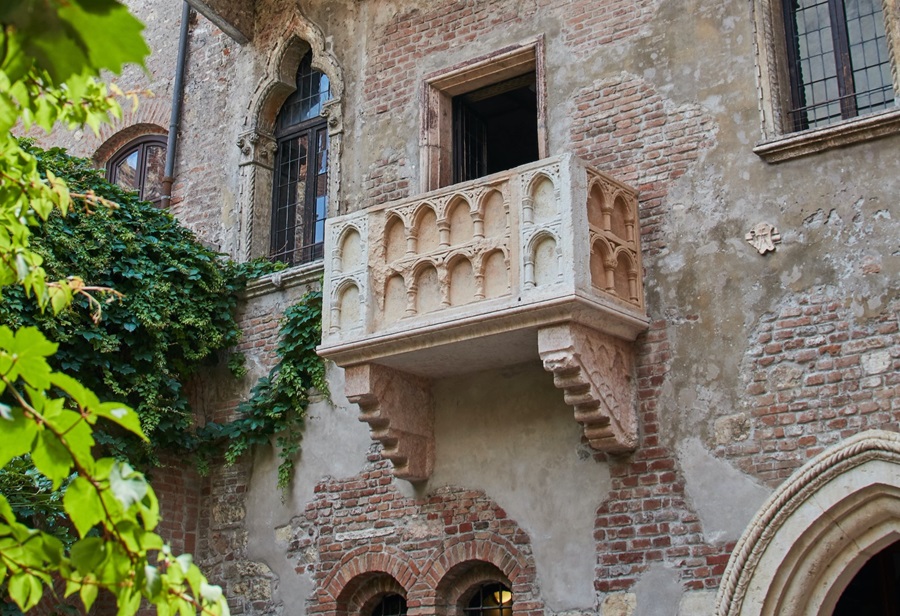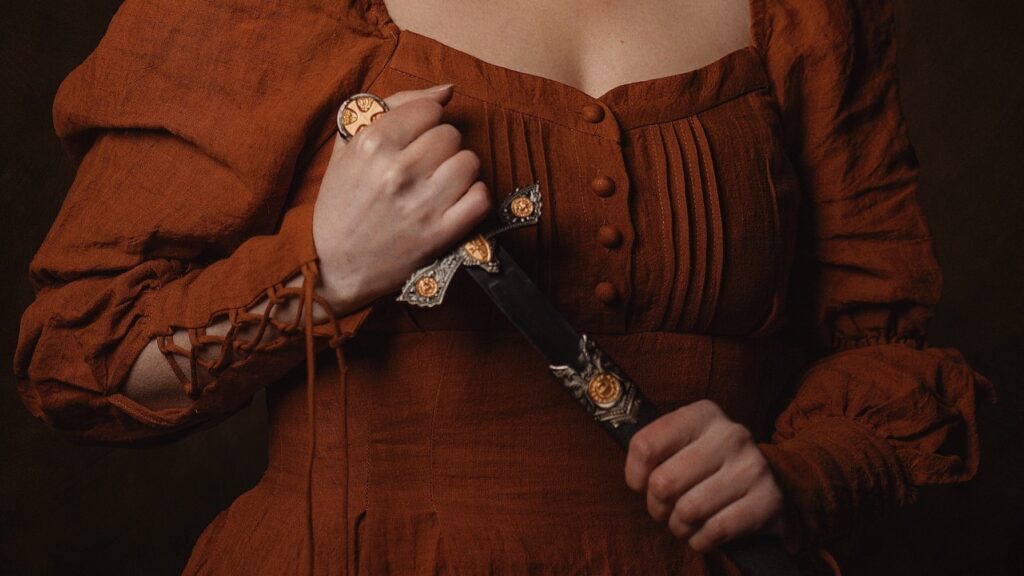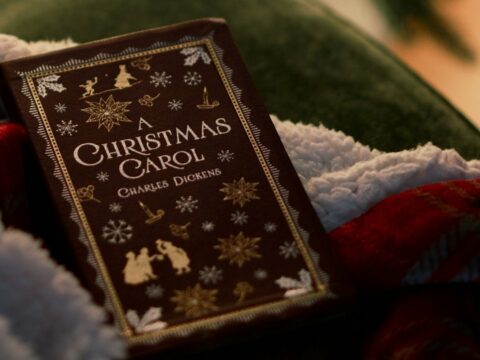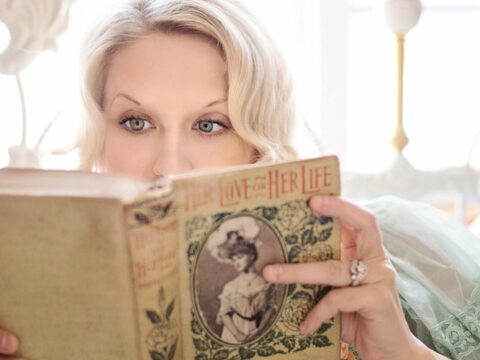People are asking me a lot lately if I’m a Shakespeare fan, probably because I named my baby after the heroine of Romeo and Juliet. So in case you didn’t know, I’m guilty as charged. I have adored Shakespeare since the day I found out who the guy was. Although I could never pick a favorite play, Romeo and Juliet is definitely in my top five. Most people study this play in junior high or high school at the latest, but me? I read the play on a whim in my twenties since I’d somehow never read it in school. And I instantly loved it.
It’s Kind of the Archetype of All Love Stories
I mean come on, it’s iconic for a reason. Shakespeare based his story off of the Greek myth of Pyramus and Thisbe, another young couple who was forbidden to wed because of a rivalry between their two families. Aside from the romance of Romeo and Juliet, it also has beautiful imagery. A meet cute at a masquerade ball? Vows exchanged on a garden balcony? A secret wedding? Warring families, forbidden love, and a potion that makes a young girl appear dead then suddenly come back to life? It sure sounds like a fairy tale to me.
Combine all that delicious detail with Shakespeare’s prose and it’s no wonder why Romeo and Juliet is a classic.
But soft, what light through yonder window breaks?
Romeo and Juliet, Act 2, scene 2
It is the East, and Juliet is the sun.
Arise, fair sun, and kill the envious moon,
Who is already sick and pale with grief
That thou, her maid, art far more fair than she.

But Unfortunately, this Story Has Also Become the Butt of Many Jokes
Despite being the most recognizable of all of Shakespeare’s work, Romeo and Juliet really brings out the haters. It’s been parodied about a thousand times, and the lovey-dovey nature of the story seems to bring out the inner 10-year-old boy in many people. Let the eye rolls and snide comments commence.
For the record, I stand firm that Romeo and Juliet does not deserve all the hate it gets. Even if you’re not into romance, this play is about so much more than horny teenagers. Firstly, the entire plot is centered on a feud between two powerful families. There’s blood, sword fighting, and mayhem in the very first scene for crying out loud. How much more excitement could you want?
But even with the thrilling opener, the most common criticism I hear about this play is that the two kids weren’t really in love. How could they have been when they knew each other for less than three days? Some people even have the impression that this young couple was responsible for the tragic outcomes of their story. Wasn’t it their own fault that they both ended up dead?
If you haven’t guessed it yet, I super, SUPER disagree with this sentiment.
So I’m Here to Make the Case for Romeo and Juliet
There are a boatload of reasons why I think this play deserves respect. Maybe romance isn’t everyone’s cup of tea, but there’s so much more to this story than fast love. And even that aspect of Romeo and Juliet is both relatable and perfectly kosher in the context of the society where these kids grew up. Plus Shakespeare’s brilliant delivery of the entire story is nothing to scoff at. For being one of the Bard’s shortest plays, it is PACKED with nuance and enduring messages that have led to its prolific reputation and vast popularity.
So if you’ll indulge me, let’s take a walk through the contextual aspects of this story that readers don’t think about or simply don’t know.
Firstly, the Message of this Play is NOT that Young Love Is Stupid
I get really annoyed by how many people think that Romeo and Juliet were idiots for falling for each other so quick. Admittedly, I have strong opinions about people getting married too young and too fast, namely because I got married later in life. But I’m also a believer in a couple simple facts: 1) Just because two very young people hit it off, it doesn’t automatically mean that the relationship is doomed. And 2) ALL great love stories have to start somewhere.
Why does the meet cute trope even exist? Because most teenage girls secretly dream about attending a dance and getting noticed by a handsome stranger across the room. This play is pretty much where that fantasy originates, and it holds a lot of power in our collective imaginations. Was Romeo and Juliet’s initial attraction true love right out of the gate? Debatable. Sure, you can’t really love someone you don’t know. But I do believe that you can know within minutes if there’s the potential for lasting love with someone, the kind that might even last a lifetime.

For the record, I’m of the opinion that meeting someone and deciding to marry them the next day is WAY more honorable than meeting somebody and deciding to sleep with them the same night. Our modern hook-up culture is notorious for brash decision-making. Romeo and Juliet’s fast commitment to each other is frankly way more mature by comparison, which brings me to my next point . . .
In This Time Period, Marrying Someone You Barely Knew Was Completely Normal
Truly. In Romeo and Juliet’s world, it was the norm for wealthy parents to arrange a good match for their children, even a young teen girl like Juliet Capulet. In fact, Lord and Lady Capulet spend the entire play putting the finishing touches on Juliet’s arranged marriage to Count Paris, a man much older than her who she’s met only once—at the exact same party where she bumped into Romeo actually.
So yeah, marrying young to a person you barely know is just a regular Tuesday for these people. Knowing that, the fact that Romeo and Juliet only meet twice in one day when they decide to say “I do” isn’t that crazy. Even when they tie the knot the very next day. Talk about a short engagement, kids.
Another detail people often forget is that this fast secret marriage is fully supported by Friar Laurence, Romeo’s mentor figure and wise old man. The friar is the emotional glue that holds this play together, and the fact that a respected authority figure supports this whirlwind romance says a lot. Friar Laurence does caution Romeo that “they stumble who run fast,” a foreshadowing of later brash decisions on Romeo’s part. But as an outsider of the whole family feud, the friar seems to have no problem marrying the kids immediately because he can see plain as day . . .
Romeo and Juliet Are Actually a Perfect Match
And when I say perfect, I’m not just talking about their initial spark. I mean they’re literally perfect for each other on paper.
If you put aside the bad blood between their families, these two characters are basically meant for each other. Romeo and Juliet both come from wealthy, reputable families in the same town. They’re both well-educated with genteel upbringings. Both kids are young and interested in settling down, and both are exceptionally good-looking. These two are pretty much the prince and princess of Verona. Under ANY other circumstances, they would make a perfect couple that the whole town and both families would celebrate.
Shakespeare further emphasizes the beauty of this match by flooding their love scenes with religious iconography. Romeo compares his love for Juliet to baptism, a sacred ritual that purges his sin and restores his life. He idolizes her as a saint, the rising sun itself. Comparisons like these only draw attention to how exceptional this pair is.

There’s just that pesky detail that their parents hate each other. And therein lies the reason that these lovers are star-crossed. The stars weren’t against this match because they wouldn’t have worked; fate worked against them because they were stuck in a crappy situation that didn’t allow them to be together. If you ask me, the perfectness of both their compatibility and immediate chemistry is the whole reason why this story is so tragic. These kids are great, and they could’ve had it all if their stupid fathers had just worked things out.
At Its Core, This Story Is about Pride
Romeo and Juliet is just as much a family feud story as it is a love story. And sadly it’s the ultimate example of the sins of the parents being visited upon the children. Everyone suffers as a result.
It’s interesting that the play never specifies why the Montagues and the Capulets hate each other. Just that something happened between the two patriarchs of the families. Now all Hell has broken loose with both of their clans at war. Friar Laurence is determined to end this rivalry once and for all. He optimistically (though wrongly) believes that Romeo and Juliet’s marriage is the key to ending this feud.

I could see how it might’ve worked. But alas, too much was stacked against it. In the end, Romeo is banished for killing Tybalt, Juliet fakes her death attempting to escape Verona, and Romeo never receives word of the ruse. The final result is a double suicide of despair, all because Romeo and Juliet were hiding a romance from their stubborn parents.
And let’s be clear, these dads were totally willing to die on this hill, or at least sacrifice their kinsmen on it. This feud has gotten so intense that mass brawls are breaking out in the streets of Verona. People are dying on both sides. All of this mayhem would stop if either one of the patriarchs would get off their high horses. If they had known they would pay the ultimate price—the life of their only child—maybe they would have ended the war sooner . . .
Where be these enemies?—Capulet, Montague,
Romeo and Juliet, Act 5, scene 3
See what a scourge is laid upon your hate,
That heaven finds means to kill your joys with love,
And I, for winking at your discords too,
Have lost a brace of kinsmen. All are punished.
But Let’s Address the Infamous Double Suicide
I finally studied Romeo and Juliet in my senior year of college. When my class discussed the tragic ending of both lovers killing themselves, most of my classmates weren’t exactly sympathetic. So two dumb teenagers made a mistake and chose to handle their grief permanently. Seems pretty dramatic. Then our professor astutely pointed out that there are things worth dying for in life. For Romeo and Juliet, their love was one of those reasons.

Another thing most people don’t think about is just how young and vulnerable these two main characters are. These are adolescents we’re talking about, perhaps as young as thirteen years old in Juliet’s case. When it comes to teen suicide, still-developing adolescent brains just aren’t capable of seeing past a state of overwhelming grief. Especially without support.
For Romeo, Juliet’s Death Meant He Had No Future
Remember, Romeo has been banished from Verona for killing Tybalt. He lost his home, his family, and any future plans he had in the place he grew up. Despite all of this, Romeo picks himself up and seeks refuge in Mantua, patiently awaiting the day that Juliet can reunite with him. The hope of building a life with his true love, no matter where that life unfolds, was what kept Romeo going in the face of so much loss.
So imagine when he receives news of Juliet’s death and realizes that he has nothing. No wife, no home, no hope of relief, and no future. Romeo’s all-consuming despair drives him to purchase poison from an apothecary. He then visits the Capulet crypt to look on his Juliet one last time. It’s only after Romeo has poisoned himself that Juliet awakes from her induced coma and finds the love of her life dead right in front of her.
Unlike Romeo, Juliet Knows Exactly What Her Future Holds
Juliet already has a thorough education on what will happen to her after she’s discovered alive in the crypt. With no Romeo to flee to in Mantua, Juliet will be stuck in Verona. Before her untimely coma, she was promised to marry Count Paris within days. Paris may have died on Romeo’s sword, but Juliet knows full well how quickly and easily her parents will betroth her to another suitable match and marry her off nice and quick. All in the name of stability.
While Romeo was facing an ocean of isolation that he couldn’t endure, Juliet’s fate is to grieve her beloved husband in the bed of another man. Is it any wonder that Juliet decided death would be preferable to such a circumstance? Could any woman survive that fate, even as an adult?

So What Do You Think? Were Romeo and Juliet Actually in Love?
Their love story was tempestuous and sudden, sure, but Romeo and Juliet is about more than bad decisions that end in disaster. It’s a story about seizing your moment even when all the odds are stacked against you. Maybe these teenagers were more in hormones with each other than in love. But I still think this budding relationship was heading somewhere exceptional—and these two young people had every right and reason to choose each other.
There’s no question that they both chose to die for one another. Maybe they didn’t know every detail about each other’s likes, dislikes, and whole life story. But they did know that they wanted to spend the rest of their lives together. That isn’t nothing. In fact, that sounds like the beginning of a love that most people only dream of.
If you ask me, it was their potential for an incredible relationship that made Romeo and Juliet’s deaths so tragic. After all, it’s the loss of something so pure and so rare that turns a love story into a tragedy. ❧





